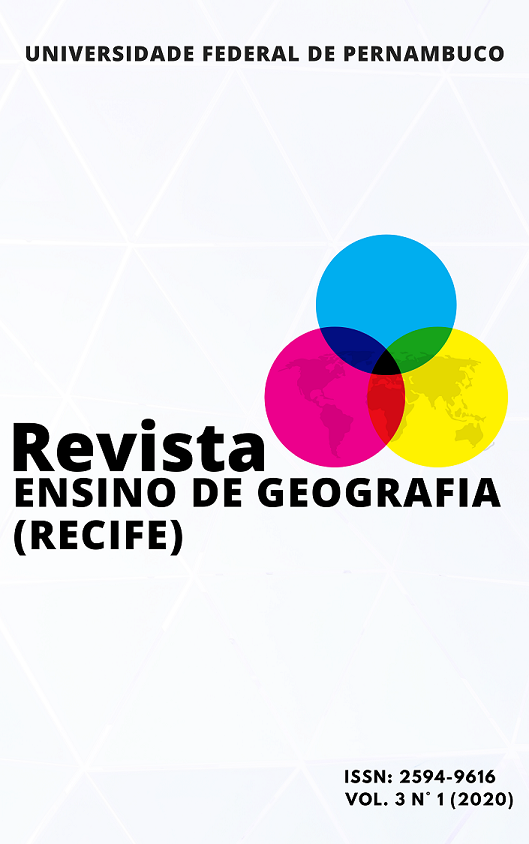The evidence in assessing school learning: characterizing elements of the learning verification instrument
DOI:
https://doi.org/10.51359/2594-9616.2020.243878Keywords:
Teaching, Geography, Evaluation, ProofAbstract
This study discusses the evaluation of school learning in the area of geography teaching, from the identification of the elements that characterize the learning verification instrument -PROVA. The objective is to analyze the PROVA from two aspects: a) Regarding the teaching content approached, in relation to the teacher's planning, identifying the subjects and themes, in order to verify the correlation and the technical quality of the indication of knowledge, skills and attitudes to validate. b) The didactic-pedagogical characteristics (design): type of questions; distribution of questions; formulation of questions; correction-key and form of disclosure of the results. The sample of random type is composed of evaluation instruments in the PROVA modality, applied in public and private schools, having as inclusion criteria that the instrument addresses the geography teaching content; applied in the elementary school class; prepared by the teacher responsible for teaching the content. The method of analysis is based on simple descriptive statistics (FEIJOO, 2010). As for the results we identified that most of the indicators of fragility of the PROVA instruments are associated with the technical aspects, with emphasis on those related to the prioritization of types of questions and the domain of knowledge and skills
References
FEIJOO, AMLC. A pesquisa e a estatística na psicologia e na educação.Rio de Janeiro: Centro Edelstein de Pesquisas Sociais, 2010, 109p
FILIZOLA, R. Didática dageografia:proposições metodológicas e conteúdos entrelaçados com a avaliação. Curitiba: Base Editorial, 2009.
GRÉGOIRE, J. Avaliando as aprendizagens:os aportes da psicologia cognitiva. Porto Alegre: Artes Médicas Sul, 2000.
HOFFMANN, Jussara. Avaliação mediadora:uma prática em construção da pré-escola à universidade. 7. Ed. Porto Alegre: Mediação, 1993.
HOFFMANN, Jussara. Pontos e Contrapontos: do pensar ao agir em avaliação. 5. ed. Porto Alegre: Mediação, 2000.
HOFFMANN, Jussara. Avaliação, mito e desafio:uma perspectiva construtivista. Porto Alegre: Mediação, 2001
HOFFMANN, Jussara. Avaliar para promover:as setas do caminho. 15. ed. Porto Alegre: Editora Mediação,2014
KROTON. Manual para elaboração e revisão de questões para avaliação.VP Acadêmica Kroton, 2017.
LENT,Roberto. Cem bilhões de neurônios?Conceitos fundamentais de neurociência.São Paulo: Atheneu, 2010.
LUCKESI, C. C. Avaliação da aprendizagem escolar:estudos e proposições. 22. ed. São Paulo: Cortez, 2011.
LUCKESI, C. C. Avaliação da aprendizagem escolar.18ed. São Paulo: Cortez, 2006.
LUCKESI, C. C. Avaliação em educação:questões epistemológicas e práticas. São Paulo: Cortez Editora, 2018.
MORAES, Dirce Aparecida Foletto de. Avaliação formativa:re-significando a prova no cotidiano escolar. 2008. 146f. Dissertação (Mestrado em Educação) –Universidade Estadual de Londrina, Londrina, 2008.
MORETTO, Vasco Pedro. Prova: um momento privilegiado de estudo não um acerto de contas. 2ªed. Rio de Janeiro: DP&A, 2002.
MORETTO, Vasco Pedro. Prova: um momento privilegiado de estudo, não um acerto de contas. 9. ed. Rio de Janeiro: Lamparina, 2010.
PERRENOUD, Philippe. Avaliação:da excelência à regulação das aprendizagens. Entre duas lógicas. Porto Alegre. ArtMed: 1999.
RUSSEL, Michael K.; AIRASIAN, Peter W. Avaliação em sala de aula: conceitos e aplicações. Porto Alegre. MacGraw Hill Educacion,
SACRISTÁN, Gimeno; GÓMEZ, A. I. Pérez. Compreender e transformar o ensino.Trad. Ernani F. da Fonseca Rosa. 4 ed. Porto Alegre: ArtMed, 1998. Penso. 2015.
ZABALA, Antoni. A Prática educativa como ensinar.Porto Alegre: Artemed, 1988.
Downloads
Published
How to Cite
Issue
Section
License
Copyright (c) 2021 Elaine Cristina Medeiros Pereira, Francisca Samara Kizia Bezerra do Nascimento, José do Carmo Filho, Lucas Gabriel Silva, Maria das Lágrimas Leite Minervino, Tânia Cristina Meira Garcia

This work is licensed under a Creative Commons Attribution 4.0 International License.
Authors who publish with this journal agree to the following terms:- Authors retain copyright and grant the REVISTA ENSINO DE GEOGRAFIA (RECIFE) right of first publication with the work simultaneously licensed under a Creative Commons Attribution NonCommercial International 4.0 (CC BY-NC) that allows others to share the work with an acknowledgement of the work's authorship and initial publication in this journal.
- Authors are able to enter into separate, additional contractual arrangements for the non-exclusive distribution of the journal's published version of the work (e.g., post it to an institutional repository or publish it in a book), with an acknowledgement of its initial publication in this journal.
- Authors are permitted and encouraged to post their work online (e.g., in institutional repositories or on their website) prior to and during the submission process, as it can lead to productive exchanges, as well as earlier and greater citation of published work.



